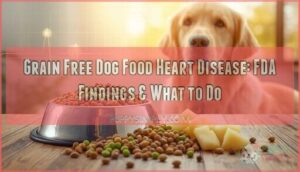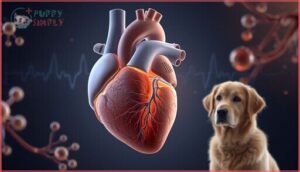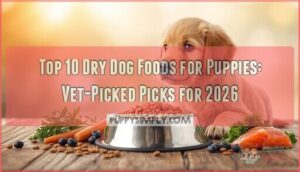This site is supported by our readers. We may earn a commission, at no cost to you, if you purchase through links.
In July 2018, the FDA began investigating something unexpected: previously healthy Golden Retrievers and Labrador Retrievers were developing dilated cardiomyopathy, a serious heart condition that generally didn’t affect these breeds. The common thread? Most were eating grain-free dog food containing peas, lentils, or potatoes.
Over the next four years, the agency received 1,382 reports linking grain-free dog food to heart disease, prompting dog owners nationwide to question whether their pet’s trendy diet might be doing more harm than good.
While the FDA’s investigation concluded in 2022 without definitive proof of causation, the findings raised important questions about ingredient quality, nutritional completeness, and breed-specific sensitivities. Understanding what the research revealed, which dogs might be at risk, and how to evaluate your own pet’s diet can help you make informed decisions about their long-term health.
Table Of Contents
- Key Takeaways
- Why is Grain-Free Dog Food Under Investigation?
- What is Canine Dilated Cardiomyopathy (DCM)?
- How Might Grain-Free Diets Affect Heart Health?
- What Has The FDA Found So Far?
- What Are The Risks for Different Dog Breeds?
- What Should Dog Owners Do Now?
- Frequently Asked Questions (FAQs)
- Does a grain-free diet help a dog’s heart?
- Is dog food a grain-free diet?
- Can a grain-free diet cause heart disease?
- Why do vets not recommend grain-free?
- What dog food is not linked to heart disease?
- What is the life expectancy of a dog with DCM?
- Can grain-free diets cause nutrient deficiencies?
- What dietary factors may contribute to DCM development?
- How can owners monitor their dogs heart health?
- Are there any alternatives to grain-free diets?
- Conclusion
Key Takeaways
- The FDA investigated 1,382 cases linking grain-free dog foods (especially those with peas, lentils, and potatoes) to dilated cardiomyopathy in dogs, but concluded in 2022 without proving direct causation—though the pattern raised enough concern to warrant dietary caution.
- Breeds not typically prone to heart disease, like Golden Retrievers and Labrador Retrievers, developed DCM while eating grain-free diets, with 90% of reported cases involving legume-heavy formulas that may interfere with taurine absorption and heart function.
- Diet-associated DCM often reverses when caught early and the dog switches to a grain-inclusive diet, unlike hereditary DCM which progresses irreversibly—making early detection through monitoring for symptoms like exercise intolerance, coughing, and rapid breathing critical.
- Veterinarians recommend choosing dog foods that follow WSAVA guidelines and AAFCO compliance with proven feeding trials, prioritizing brands with veterinary nutritionists on staff over trendy grain-free formulas that lack long-term safety research.
Why is Grain-Free Dog Food Under Investigation?
The FDA’s investigation into grain-free dog food began in 2018, when veterinarians started reporting an unusual pattern they couldn’t ignore.
Dogs that shouldn’t have been at risk for heart disease were developing dilated cardiomyopathy, and many of them shared a common thread in their diets.
Here’s what triggered the investigation and why it continues to concern veterinary cardiologists today.
FDA Investigation Timeline and Triggers
The FDA investigation into dog food began quietly in 2014 with initial DCM reports, but the public alert impact came in July 2018 when officials highlighted grain-free diets. That announcement triggered a reporting surge through the Safety Reporting Portal.
Data release details showed 1,382 cases by November 2022, though reporting bias likely inflated numbers. The investigation conclusion in December 2022 found insufficient evidence linking specific foods to DCM. The FDA investigated the potential link to DCM in certain dog foods.
Reports of Heart Disease in Non-Predisposed Breeds
What caught investigators’ attention wasn’t just the number of cases—it was who was getting sick. Golden Retrievers and Labrador Retrievers, breeds not usually prone to DCM, suddenly appeared in over 1,100 FDA reports. These atypical DCM cases represented a troubling shift in breed susceptibility factors. The FDA continues to investigate the role of diet as a factor in these cases.
- Approximately 90% of reported dogs ate grainfree dog food containing peas, lentils, or potatoes
- Mixed breeds and medium-sized dogs showed emerging DCM trends previously unseen
- Labrador Retrievers became the third most reported breed despite no hereditary predisposition
- Diet ingredient analysis revealed grain-free correlation across non-traditional DCM breeds
Popularity and Rise of Grain-Free Diets
The timing wasn’t coincidental. Grain-free dog food sales surged over 200% in North America between 2012 and the FDA’s 2018 investigation, driven by marketing strategies that positioned these products as healthier alternatives.
Dog owners, influenced by human diet trends and consumer perceptions about ancestral feeding, spent billions on grain-free diets—often unaware of potential risks to their pets’ health and wellbeing.
What is Canine Dilated Cardiomyopathy (DCM)?
To understand the connection between grain-free diets and heart disease, you need to know what DCM actually is. This condition affects your dog’s heart muscle in ways that can become life-threatening if left unchecked.
Let’s break down what DCM means for your dog, which breeds face the highest risk, and how diet-related cases differ from the inherited form.
Definition and Symptoms of DCM
Your dog’s heart depends on strong, coordinated muscle contractions—but dilated cardiomyopathy flips that script. A DCM diagnosis requires documented ventricular dilation and systolic dysfunction, where the heart’s pumping power drops below 25% efficiency.
Clinical signs include rapid breathing beyond 30 breaths per minute, persistent coughing, lethargy, and sometimes collapse. Echocardiography confirms chamber enlargement with thinned walls, revealing heart disease that demands immediate attention.
Breeds Most and Least at Risk
Large and giant purebreds—Doberman Pinschers, Great Danes, Irish Wolfhounds, Boxers, and Newfoundlands—carry genetic factors that drive up to 60% of traditional dilated cardiomyopathy cases.
Yet the FDA’s grain-free dog food investigation revealed atypical cases in Golden Retrievers, Labrador Retrievers, and even small breeds like Shih Tzus.
Breed predisposition still matters, but diet interaction can trigger DCM in dogs you’d never expect.
Hereditary Vs. Diet-Associated DCM
Unlike hereditary DCM, which targets breeds with genetic predisposition like Dobermans and progresses irreversibly, diet-associated DCM strikes any breed and often reverses when caught early. Breed differences matter less with dietary factors—Golden Retrievers on grain-free diets can develop dilated cardiomyopathy despite normal taurine levels.
Diagnostic markers and prognosis outcomes separate these two forms, with diet-change survival reaching 337 days versus hereditary cases’ 17.5% one-year rate.
How Might Grain-Free Diets Affect Heart Health?
The connection between grain-free diets and heart disease isn’t fully understood yet, but researchers have identified some patterns worth examining.
Most of the reported cases involve foods with specific ingredient profiles that differ from traditional dog food formulas. Let’s look at what makes these diets unique and why certain ingredients have raised concerns.
Common Ingredients in Grain-Free Foods
When you flip over a bag of grain-free dog food, you’ll notice a pattern. Peas rank as the most common plant-based carbohydrate, appearing in 93% of DCM-associated formulas. Lentils follow closely, listed within the first ten ingredients in over 90% of implicated products.
Chicken leads protein sources at 60%, while potatoes and sweet potatoes serve as starch alternatives in 42% of cases. Tapioca and cassava appear less frequently but still feature prominently in certain recipes.
Pulses, Potatoes, and Potential Risks
What’s happening inside your dog’s digestive system when they eat pulse-heavy dog food? Studies show these diets reduce nutrient absorption and increase fecal bile acid loss, forcing your dog’s body to use more taurine for bile acid synthesis.
Metabolomic findings reveal unique compounds in pulse and potato formulas, yet evidence gaps remain—the FDA hasn’t confirmed direct causation between pulses, potatoes, and DCM.
The Role of Taurine and Deficiency
Think of taurine as your dog’s cardiac fuel—it makes up over half the amino acids in their heart muscle and powers every heartbeat. When blood taurine levels drop below 250 nmol/mL, cardiac function weakens.
Taurine fuels your dog’s heart with every beat, and when levels drop below 250 nmol/mL, cardiac function weakens
Breed susceptibility varies: golden retrievers and cocker spaniels face higher risk.
Dietary factors matter most—low-protein diets lacking sulfur-containing amino acids trigger deficiency, but supplementation outcomes show real promise for reversing damage.
What Has The FDA Found So Far?
The FDA’s investigation has generated a substantial body of data, though the findings come with important caveats. Since 2014, the agency has collected reports from veterinarians and pet owners that paint a concerning picture of DCM cases linked to certain diet patterns.
Here’s what the numbers, brands, and research limitations reveal so far.
Number and Nature of Reported Cases
Between January 2014 and April 2019, the FDA received 524 DCM case reports—515 dogs, 9 cats—with numbers climbing to 1,382 by November 2022. Most reports flooded in after the FDA’s July 2018 alert, highlighting reporting bias rather than a sudden surge in disease.
Affected dogs ranged from asymptomatic to cases of sudden death:
- Atypical breeds like Shih Tzus and Miniature Schnauzers appeared alongside predisposed breeds
- Multiple household dogs sometimes developed canine heart disease on the same dog food
- Some dogs showed clinical improvement after diet changes
- Others had normal taurine levels and didn’t respond to intervention
- Data limitations prevent estimating true DCM prevalence
These case report volume patterns reflect awareness, not necessarily rising risk.
Dog Food Brands and Ingredients Linked to DCM
The FDA’s reports highlight specific dog food brands and ingredients linked to health concerns. Acana had 67 DCM reports, Zignature had 64, and Taste of the Wild appeared in 53 instances. Legume-heavy ingredients dominated, with 93% of implicated foods containing peas or lentils. Potato-containing formulations appeared less frequently. Protein sources and taurine levels varied, with some brands supplementing heavily. These patterns guide your ingredient-checking efforts.
| Brand | DCM Reports | Common Ingredients |
|---|---|---|
| Acana | 67 | Peas, lentils, novel proteins |
| Zignature | 64 | Legumes, high taurine supplementation |
| Taste of the Wild | 53 | Peas, potatoes, varied proteins |
| 4Health | 32 | Pea protein, potatoes, beef |
| Blue Buffalo | 31 | Peas, lentils, chicken/fish |
Limitations and Ongoing Research
While those brand names catch your attention, the FDA’s investigation has collected over 1,382 DCM reports without establishing direct causation vs. correlation.
Study sample sizes remain small—often fewer than 10 dogs—and short-term feeding trials lasting 28 days can’t reveal long-term effects.
Research funding bias, inconsistent taurine supplementation protocols, and breed variability complicate conclusions.
Scientists need more time to untangle these grain-free dog food concerns surrounding canine heart disease.
What Are The Risks for Different Dog Breeds?
Not all dogs face the same level of risk with respect to diet-associated DCM. Some breeds have a genetic predisposition to heart disease, while others have shown up in FDA reports despite no known hereditary link.
Understanding how your dog’s breed, size, and individual sensitivities factor into this equation can help you make more informed decisions about their diet.
Large and Giant Breeds
Doberman Pinschers, Great Danes, and other large breeds face the highest DCM prevalence, making dietary factors particularly concerning when they’re eating grain-free dog food.
The FDA reports include numerous cases of dilated cardiomyopathy in Labs, Goldens, and similar breeds consuming diets high in legumes and potatoes. These dogs may have heightened breed risks due to lower taurine production, potentially worsening taurine deficiency when combined with certain ingredients.
Atypical Cases in Small and Medium Breeds
While large breeds grab most headlines, rising DCM incidence in small and medium dogs is drawing attention. Non-hereditary factors linked to grain-free dog food—especially those rich in pulses—have surfaced in breeds like Miniature Schnauzers and Shih Tzus.
Age at diagnosis skews older, but statistical limitations mean you should stay vigilant, regardless of your dog’s size or breed.
Breed-Specific Sensitivities to Diet
Your dog’s genes don’t tell the whole story. Genetic predispositions interact with diet in ways researchers are still untangling, creating breed-specific health risks that vary widely.
- Golden Retrievers showed taurine deficiency in 95% of DCM cases linked to legume-heavy foods
- Dobermans rarely develop DCM from taurine issues, suggesting different diet interactions
- Clinical outcomes improved across multiple breeds after switching from grain-free diets
- Research limitations mean breed susceptibility remains incompletely understood
What Should Dog Owners Do Now?
If your dog is currently eating a grain-free diet, you don’t need to panic, but you shouldn’t ignore the FDA’s findings either.
There are practical steps you can take right now to protect your dog’s heart health while researchers continue to investigate the connection.
Here’s what veterinary cardiologists recommend for concerned dog owners.
Monitoring for Signs of DCM
You’ll want to watch for early signs of DCM, since catching heart disease before it advances gives your dog the best chance. Exercise intolerance and respiratory distress—like coughing or heavy breathing—show up in over 90% of affected dogs. Fluid accumulation, especially a swollen belly, signals trouble too.
During routine checkups, cardiac auscultation can detect abnormal heart rhythms. For dogs on grain-free diets, ask your vet about subclinical monitoring through periodic echocardiograms.
Veterinary Guidance on Dog Food Choices
When choosing your dog’s diet, lean on professionals who follow WSAVA Guidelines and conduct thorough nutritional assessments. Your veterinarian can steer you toward brands that prioritize ingredient transparency and have nutritionists on staff.
If your dog has been eating grain-free, a veterinary cardiologist consultation may include cardiac monitoring during the diet change.
Don’t navigate this alone—veterinary recommendations are your best compass through confusing food labels.
Evaluating Ingredient Lists and Diet Changes
Reading your ingredient list is like checking a map before a long trip—you need to know where you’re headed. Look for peas, lentils, chickpeas, or potatoes in the top ten ingredients, even if they appear multiple times in different forms.
Gradual transitions over seven to ten days prevent stomach upset, but ongoing monitoring with follow-up echocardiograms and taurine testing reveals whether dietary changes actually improve your dog’s heart health.
Frequently Asked Questions (FAQs)
Does a grain-free diet help a dog’s heart?
Imagine a Cocker Spaniel whose heart struggles from taurine-deficient DCM, then rebounds after switching diets.
Grain-free formulas don’t inherently help canine heart disease—in fact, some FDA-reported cases showed diet DCM reversal only after reintroducing grains and restoring taurine.
Is dog food a grain-free diet?
Not all dog food is grain-free. Traditional formulas contain grains like rice, corn, or wheat, while grain-free options replace these with legumes, potatoes, or other ingredient alternatives. Check food labeling carefully.
Can a grain-free diet cause heart disease?
Like rotary phones in a smartphone era, definitive causality remains elusive. The FDA hasn’t proven grain-free diets directly cause DCM, but taurine absorption issues and legume-heavy formulas warrant veterinary diet advice for atypical breed risks.
Why do vets not recommend grain-free?
Most veterinarians view grain-free formulations as under investigation, lacking long-term studies and AAFCO feeding trials. Ingredient concerns—especially pulses and potatoes—plus disproportionate DCM reports drive veterinary consensus favoring traditional, well-researched diets for nutritional adequacy and safety.
What dog food is not linked to heart disease?
You want diets that follow WSAVA guidelines and AAFCO compliance, confirmed by feeding trials.
Grain-inclusive dog food with lower legume content, produced by research-focused manufacturers, offers a balanced diet with veterinary input guiding your choice.
What is the life expectancy of a dog with DCM?
The clock on canine dilated cardiomyopathy isn’t set in stone—median survival ranges from weeks to over two years, depending on disease stage at diagnosis, clinical risk factors, and whether medical therapy or diet change can reverse the damage.
Can grain-free diets cause nutrient deficiencies?
Yes, grain-free dog food can cause nutritional deficiencies. High legume reliance interferes with mineral absorption through phytate interference, potentially reducing zinc and iron bioavailability.
Taurine synthesis may also be compromised, affecting essential nutrients for dogs’ balanced diet.
What dietary factors may contribute to DCM development?
Several factors may raise DCM risk: low protein quality lacking taurine precursors, high pulse ingredients like peas and lentils, taurine deficiency from poor diet formulation, and nutrient imbalances affecting heart function.
How can owners monitor their dogs heart health?
Regular cardiac health assessment at your vet catches problems early, while home monitoring of breathing rates and stamina helps you spot warning signs.
Diet review and medication compliance support your dog’s heart function long-term.
Are there any alternatives to grain-free diets?
If you’re rethinking grain-free dog food, grain-inclusive or pulse-free options work well—both meet your dog’s nutritional needs.
Veterinary diets and hydrolyzed formulas help manage specific issues, while consulting a veterinarian ensures a balanced diet suited to your pet.
Conclusion
What matters most when your dog’s health is on the line? Not trends, but evidence. The grain-free dog food heart disease investigation didn’t provide absolute answers, but it highlighted the importance of choosing diets backed by veterinary nutritional science.
Monitor your dog for signs of DCM, consult your veterinarian before making dietary changes, and prioritize foods formulated by credentialed experts. Your dog’s heart deserves more than marketing promises—it deserves nutritional integrity.
- https://www.akc.org/expert-advice/nutrition/fda-grain-free-diet-alert-dcm/
- https://wefeedraw.com/blog/fda-finds-no-link-between-grain-free-and-dcm
- https://www.frontiersin.org/journals/animal-science/articles/10.3389/fanim.2022.846227/pdf
- https://pmc.ncbi.nlm.nih.gov/articles/PMC12656978/
- https://www.fda.gov/animal-veterinary/news-events/fda-investigation-potential-link-between-certain-diets-and-canine-dilated-cardiomyopathy















